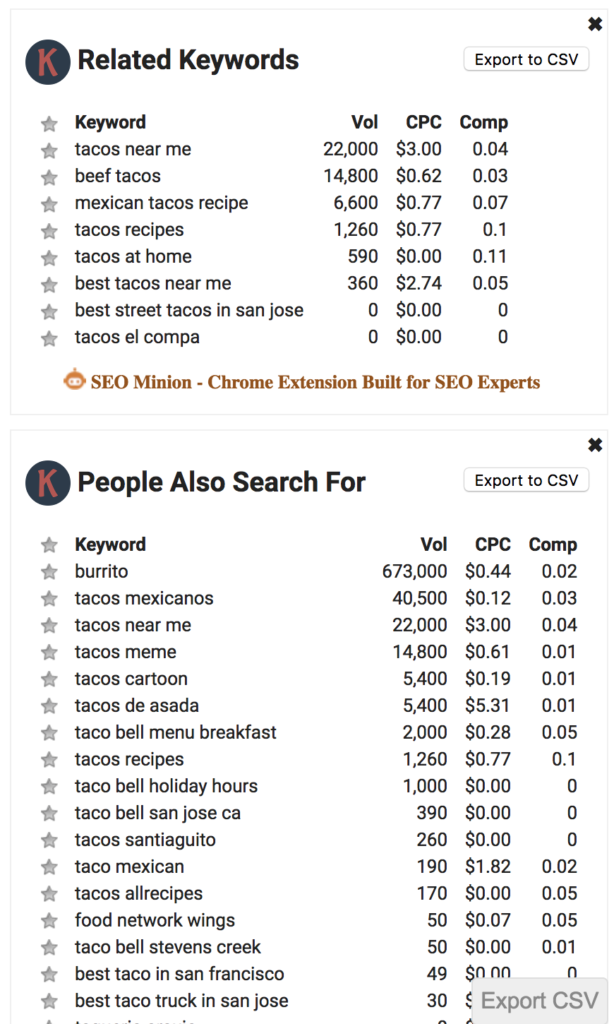SEO (or search engine optimization) is a super powerful tool to wield when starting your therapy private practice. And keyword planning is a key component of SEO for therapists. If you have no idea what I’m talking about, don’t worry! I make it easy for you in this article all about keyword planning for therapists.

Before diving into SEO for therapists, be sure to complete the steps that come beforehand. Particularly, it’s important to find your niche and build your website.
Just getting started in private practice? Sign up for my complete checklist to get started in private practice to get yourself on the right track. Circle back here when you’re ready to build the content for your therapy website!
SEO for Therapists
Does “SEO” and “Keyword Planning” sound like a bunch of techie mumbo-jumbo to you? Not too long ago, I thought I would never understand SEO. I thought I had to understand coding and website design and all things tech in order to ever master it.
Not true!
What is SEO?
Okay, let’s lay the groundwork here. A little over two years ago, I hadn’t even heard of SEO, let alone how to use it as a therapist in private practice. But it only takes a bit of basic knowledge to get you off the ground.
SEO stands for Search Engine Optimization. 🤔 What does that mean? Effectively, when you use a search engine such as Google to search for something, the search engine has to do the best it can to play matchmaker between the 600 million+ websites on the internet and your specific search term.
Yes, there are over 600 million active websites on the internet today! As a therapist, you have to signal to search engines exactly who you are so that when someone does a Google search for a therapist in your specific specialty, Google knows to put your website at the top.
Search Engine Optimization refers to the process of optimizing your website so that search engines like Google know exactly what you’re about and who to show your website to based on certain search terms.
SEO for therapists: how it can help us
Before the age of the internet, people primarily looked for a therapist through marketing tools like networking referrals and word of mouth. Though these tools are still relevant today, chances are most of your ideal clients are looking for you on the internet.
That means leveraging the internet as part of your private practice marketing strategy will help you maximize how many of your ideal clients find YOU in a Google search instead of someone else. Many potential clients will even give up on searching for a therapist if they can’t find a good fit through an internet search.
As a therapist, you can have the most amazing website, beautiful design, and the best content. You could be the greatest therapist on the planet! But without leveraging SEO in your website, your ideal client isn’t going to find you in a Google search. Period.
Several factors contribute to a website’s SEO. But I’ve learned over time that keyword planning is THE primary tool worth mastering to work your website’s SEO game. A few carefully selected keywords strategically placed throughout a therapists’ website content can be the biggest game changer for your website’s search ranking.
So let’s give it a go!
SEO for Therapists: Keyword Planning
What is a keyword? A keyword is essentially a word or a phrase that someone would type into a search engine in order to hopefully find your website.
It’s your job to figure out which keywords people are typing into Google relevant to your specialties and niche. It’s not enough to make sure you list your specialties multiple times throughout your website. It’s important to figure out what search terms your target demographic is typing into Google when they’re looking for a therapist.
But how do you know what search terms people are typing into Google?
I’m glad you asked! Let me introduce you to your new best friend: the keyword planning tool.
Yes, there are entire teams of engineers working to create ever-improving software to help non-techie people like us learn how to plan our keywords. I’d love to personally hug every engineer who has helped make my keyword planning process easier by creating the amazing tools available.
There are several keyword planning tools. Some are free and mediocre, and others are expensive and awesome. I’m a frugal gal with no time to fumble around tools that aren’t user-friendly. So even though there are many popular free tools available like Google Keyword Planner, I find them too fumbly to give my stamp of Marie approval (if Google Keyword Planner works best for you, more power to you!).
After using several keyword planning tools, one stands out as my absolute favorite. Let me show you how it works.
Keyword Planning Tool: Keywords Everywhere
Keywords Everywhere is by far the easiest to use keyword planning tool I’ve encountered, and it’s absolutely free!
Keywords Everywhere is a browser extension that gives you the same information you would get from Google Keyword Planner, but it shows up right in front of you within your search engine. Once you download the tool, it automatically pops up like magic with information in Google searches as well as other search platforms like YouTube, Amazon, and many others.
For example, let’s say I’m into tacos. With the keyword planner extension, I can type “tacos” into a Google search and it spits out other related search items below, but it also tells me how many searches per month each of these keywords gets. With the Keyword Planner extension, the search for “tacos” looks like this:

Better yet, once you scroll down after searching for “tacos” you find related keywords and other keywords people also search for. Here’s how it looks in my search for “tacos:”

This is amazing data that you can find really quickly now without having to log in to the Google Keyword tool. This information is important because it helps you know what potential clients might be typing into their web browser in order to find you.
How do you know which keywords are right for you? The perfect keyword for your website ought to reflect a term your ideal client is typing into search engines that also doesn’t have too much competition.
How do you determine your competition? There are two ways to do this:
- Do a Google search of that term and see what pops up. In our tacos example, “tacos near me” pops up with many search results all claiming to have the best tacos in the city (we have lots of great tacos here!). This may not be an easy keyword to target because there is too much competition. Go through several search terms until you find a good fit with not very many relevant search results.
- Use a tool like Ubersuggest to learn more information about how competitive a keyword is. We learned from Keywords Everywhere that “best taco truck in San Jose” only gets about 30 searches per month. However, Ubersuggest lets us know that it’s easy to rank for this keyword. Here’s how the data looks in this tool:

As a recap, the golden trifecta of a perfect keyword includes:
- A term relevant to your niche or specialty
- A term with a relatively high search volume
- A term with relatively low competition
If you find a phrase that captures all three of these, BINGO! You’ve found a keyword to target on your private practice website.
Once you have your keyword, it’s important to find organic ways to sprinkle it throughout your page. Include it in the title, in the headers, in the meta description, in the alt tags of photos. Anywhere there is an opportunity to include text, make sure to include your keyword organically there.
Ideally, you find one primary keyword to target on each page of your website. When you build your website, consider having a separate page for each of your specialties. That way you have opportunities to target more terms and make it more likely for a potential client to find you in a Google search. This is also a great reason to consider starting a blog, where each blog post targets a different relevant keyword.
There is lots more to cover in the topic of SEO for therapists, but if you master this you’ll be well on your way to people finding you in internet searches.
Most therapists really aren’t familiar with keyword planning, search engine optimization, and all the other techy stuff that happens on the internet, so if you put in a little bit of work, chances are high that you could rank fairly high for some of these Google search terms.
If you already had a website up and running and you’re just now putting in these keywords, you may not notice any changes in your search ranking right away. Give it a few weeks. It takes a little while to recalibrate and then hopefully you’ll show up higher in the search rankings in a few weeks.
I hope you found this article helpful as you build keywords into your website and learn about SEO for therapists. Take your time with it. With practice, it will come as second nature.
Until next time, from one therapist to another: I wish you well!
-Marie

Leave A Reply